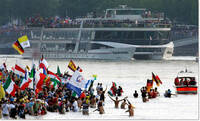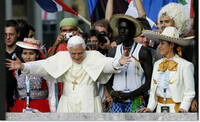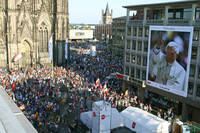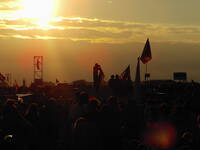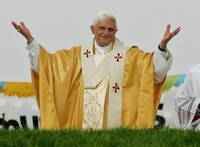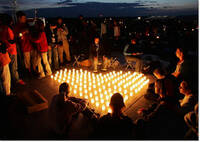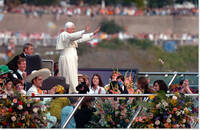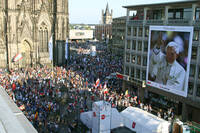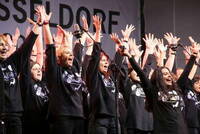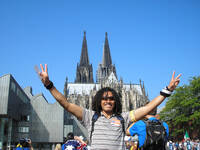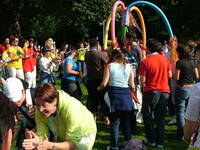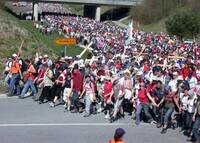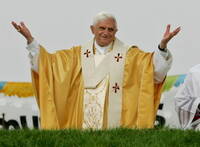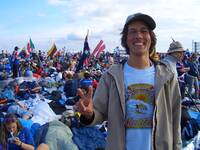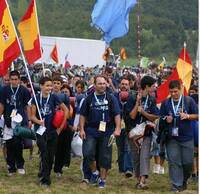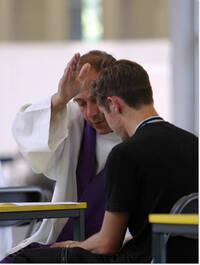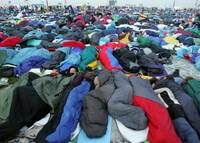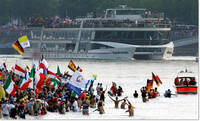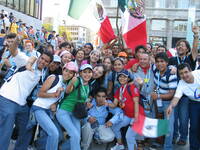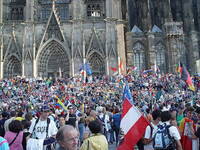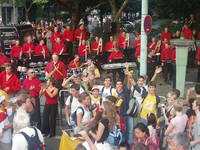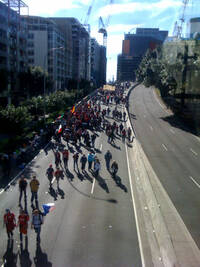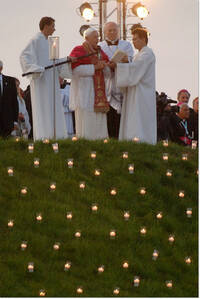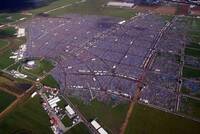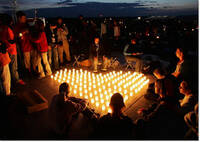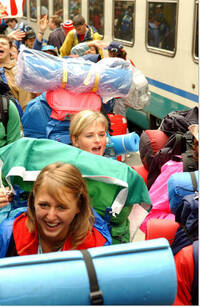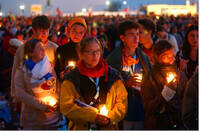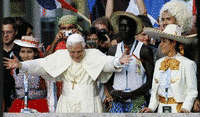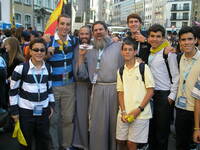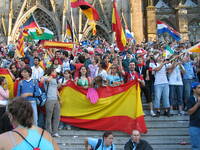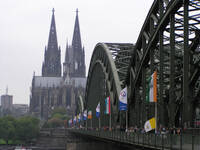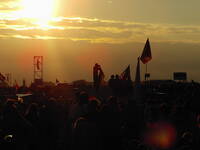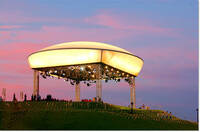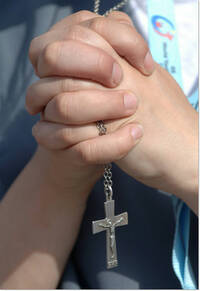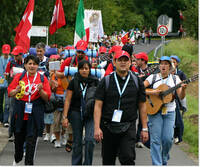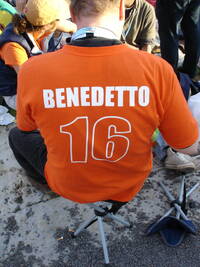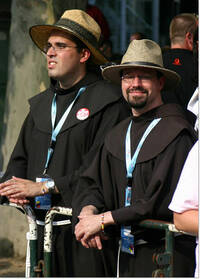World Youth Day Cologne 2005
XX Weltjugendtages - in Germany
9th international WYD / JMJ - Koln, 16-21 August 2005
This was Pope Benedict XVI's first pilgrimage abroad as Pope & it was to the first World Youth Day in his homeland of Germany. The message was written by St John Paul II on the theme:
"We have come to worship Him"
Benedict XVI's homily at Mass for the 20th World Youth Day
Marienfeld, Cologne - Sunday, 21 August 2005 - in English, French, German, Italian, Portuguese & Spanish
Prior to Mass, the Pope said the following:
"Dear Cardinal Meisner, Dear Young People,
I would like to thank you, dear Confrère in the Episcopate, for the touching words you have addressed to me which introduced us so appropriately into the Eucharistic celebration.
I would have liked to tour the hill in the Popemobile and to be closer to each one of you, individually. Unfortunately, this has proved impossible, but I greet each one of you from the bottom of my heart. The Lord sees and loves each individual person and we are all the living Church for one another, and let us thank God for this moment in which he is giving us the gift of the mystery of his presence and the possibility of being in communion with him.
We all know that we are imperfect, that we are unable to be a fitting house for him. Let us therefore begin Holy Mass by meditating and praying to him, so that he will take from us what divides us from him and what separates us from each other and enable us to become familiar with the holy mysteries."
***
"Dear Young Friends,
yesterday evening we came together in the presence of the Sacred Host, in which Jesus becomes for us the bread that sustains and feeds us, and there we began our inner journey of adoration. In the Eucharist, adoration must become union. At the celebration of the Eucharist, we find ourselves in the "hour" of Jesus, to use the language of John's Gospel. Through the Eucharist this "hour" of Jesus becomes our own hour, his presence in our midst. Together with the disciples he celebrated the Passover of Israel, the memorial of God's liberating action that led Israel from slavery to freedom. Jesus follows the rites of Israel. He recites over the bread the prayer of praise and blessing. But then something new happens. He thanks God not only for the great works of the past; he thanks him for his own exaltation, soon to be accomplished through the Cross and Resurrection, and he speaks to the disciples in words that sum up the whole of the Law and the Prophets: "This is my Body, given in sacrifice for you. This cup is the New Covenant in my Blood". He then distributes the bread and the cup, and instructs them to repeat his words and actions of that moment over and over again in his memory.
What is happening? How can Jesus distribute his Body and his Blood? By making the bread into his Body and the wine into his Blood, he anticipates his death, he accepts it in his heart, and he transforms it into an action of love. What on the outside is simply brutal violence - the Crucifixion - from within becomes an act of total self-giving love. This is the substantial transformation which was accomplished at the Last Supper and was destined to set in motion a series of transformations leading ultimately to the transformation of the world when God will be all in all. In their hearts, people always and everywhere have somehow expected a change, a transformation of the world. Here now is the central act of transformation that alone can truly renew the world: violence is transformed into love, and death into life. Since this act transmutes death into love, death as such is already conquered from within, the Resurrection is already present in it. Death is, so to speak, mortally wounded, so that it can no longer have the last word. To use an image well known to us today, this is like inducing nuclear fission in the very heart of being - the victory of love over hatred, the victory of love over death. Only this intimate explosion of good conquering evil can then trigger off the series of transformations that little by little will change the world. All other changes remain superficial and cannot save. For this reason we speak of redemption: what had to happen at the most intimate level has indeed happened, and we can enter into its dynamic. Jesus can distribute his Body, because he truly gives himself.
This first fundamental transformation of violence into love, of death into life, brings other changes in its wake. Bread and wine become his Body and Blood. But it must not stop there; on the contrary, the process of transformation must now gather momentum. The Body and Blood of Christ are given to us so that we ourselves will be transformed in our turn. We are to become the Body of Christ, his own Flesh and Blood. We all eat the one bread, and this means that we ourselves become one. In this way, adoration, as we said earlier, becomes union. God no longer simply stands before us as the One who is totally Other. He is within us, and we are in him. His dynamic enters into us and then seeks to spread outwards to others until it fills the world, so that his love can truly become the dominant measure of the world. I like to illustrate this new step urged upon us by the Last Supper by drawing out the different nuances of the word "adoration" in Greek and in Latin. The Greek word is proskynesis. It refers to the gesture of submission, the recognition of God as our true measure, supplying the norm that we choose to follow. It means that freedom is not simply about enjoying life in total autonomy, but rather about living by the measure of truth and goodness, so that we ourselves can become true and good. This gesture is necessary even if initially our yearning for freedom makes us inclined to resist it. We can only fully accept it when we take the second step that the Last Supper proposes to us. The Latin word for adoration is ad-oratio - mouth to mouth contact, a kiss, an embrace, and hence, ultimately love. Submission becomes union, because he to whom we submit is Love. In this way submission acquires a meaning, because it does not impose anything on us from the outside, but liberates us deep within.
Let us return once more to the Last Supper. The new element to emerge here was the deeper meaning given to Israel's ancient prayer of blessing, which from that point on became the word of transformation, enabling us to participate in the "hour" of Christ. Jesus did not instruct us to repeat the Passover meal, which in any event, given that it is an anniversary, is not repeatable at will. He instructed us to enter into his "hour". We enter into it through the sacred power of the words of consecration - a transformation brought about through the prayer of praise which places us in continuity with Israel and the whole of salvation history, and at the same time ushers in the new, to which the older prayer at its deepest level was pointing. The new prayer - which the Church calls the "Eucharistic Prayer" - brings the Eucharist into being. It is the word of power which transforms the gifts of the earth in an entirely new way into God's gift of himself, and it draws us into this process of transformation. That is why we call this action "Eucharist", which is a translation of the Hebrew word beracha - thanksgiving, praise, blessing, and a transformation worked by the Lord: the presence of his "hour". Jesus' hour is the hour in which love triumphs. In other words: it is God who has triumphed, because he is Love. Jesus' hour seeks to become our own hour and will indeed become so if we allow ourselves, through the celebration of the Eucharist, to be drawn into that process of transformation that the Lord intends to bring about. The Eucharist must become the centre of our lives. If the Church tells us that the Eucharist is an essential part of Sunday, this is no mere positivism or thirst for power. On Easter morning, first the women and then the disciples had the grace of seeing the Lord. From that moment on, they knew that the first day of the week, Sunday, would be his day, the day of Christ the Lord. The day when creation began became the day when creation was renewed. Creation and redemption belong together. That is why Sunday is so important. It is good that today, in many cultures, Sunday is a free day, and is often combined with Saturday so as to constitute a "week-end" of free time. Yet this free time is empty if God is not present. Dear friends! Sometimes, our initial impression is that having to include time for Mass on a Sunday is rather inconvenient. But if you make the effort, you will realize that this is what gives a proper focus to your free time. Do not be deterred from taking part in Sunday Mass, and help others to discover it too. This is because the Eucharist releases the joy that we need so much, and we must learn to grasp it ever more deeply, we must learn to love it. Let us pledge ourselves to do this - it is worth the effort! Let us discover the intimate riches of the Church's liturgy and its true greatness: it is not we who are celebrating for ourselves, but it is the living God himself who is preparing a banquet for us. Through your love for the Eucharist you will also rediscover the Sacrament of Reconciliation, in which the merciful goodness of God always allows us to make a fresh start in our lives.
Anyone who has discovered Christ must lead others to him. A great joy cannot be kept to oneself. It has to be passed on. In vast areas of the world today there is a strange forgetfulness of God. It seems as if everything would be just the same even without him. But at the same time there is a feeling of frustration, a sense of dissatisfaction with everyone and everything. People tend to exclaim: "This cannot be what life is about!". Indeed not. And so, together with forgetfulness of God there is a kind of new explosion of religion. I have no wish to discredit all the manifestations of this phenomenon. There may be sincere joy in the discovery. But to tell the truth, religion often becomes almost a consumer product. People choose what they like, and some are even able to make a profit from it. But religion sought on a "do-it-yourself" basis cannot ultimately help us. It may be comfortable, but at times of crisis we are left to ourselves. Help people to discover the true star which points out the way to us: Jesus Christ! Let us seek to know him better and better, so as to be able to guide others to him with conviction. This is why love for Sacred Scripture is so important, and in consequence, it is important to know the faith of the Church which opens up for us the meaning of Scripture. It is the Holy Spirit who guides the Church as her faith grows, causing her to enter ever more deeply into the truth. Beloved Pope John Paul II gave us a wonderful work in which the faith of centuries is explained synthetically: the Catechism of the Catholic Church. I myself recently presented the Compendium of the Catechism, also prepared at the request of the late Holy Father. These are 2 fundamental texts which I recommend to all of you.
Obviously books alone are not enough. Form communities based on faith! In recent decades, movements and communities have come to birth in which the power of the Gospel is keenly felt. Seek communion in faith, like fellow travellers who continue together to follow the path of the great pilgrimage that the Magi from the East first pointed out to us. The spontaneity of new communities is important, but it is also important to preserve communion with the Pope and with the Bishops. It is they who guarantee that we are not seeking private paths, but instead are living as God's great family, founded by the Lord through the 12 Apostles.
Once again, I must return to the Eucharist. "Because there is one bread, we, though many, are one body", says St Paul (I Cor 10, 17). By this he meant: since we receive the same Lord and he gathers us together and draws us into himself, we ourselves are one. This must be evident in our lives. It must be seen in our capacity to forgive. It must be seen in our sensitivity to the needs of others. It must be seen in our willingness to share. It must be seen in our commitment to our neighbours, both those close at hand and those physically far away, whom we nevertheless consider to be close. Today, there are many forms of voluntary assistance, models of mutual service, of which our society has urgent need. We must not, for example, abandon the elderly to their solitude, we must not pass by when we meet people who are suffering. If we think and live according to our communion with Christ, then our eyes will be opened. Then we will no longer be content to scrape a living just for ourselves, but we will see where and how we are needed. Living and acting thus, we will soon realize that it is much better to be useful and at the disposal of others than to be concerned only with the comforts that are offered to us. I know that you as young people have great aspirations, that you want to pledge yourselves to build a better world. Let others see this, let the world see it, since this is exactly the witness that the world expects from the disciples of Jesus Christ; in this way, and through your love above all, the world will be able to discover the star that we follow as believers.
Let us go forward with Christ and let us live our lives as true worshippers of God! Amen."
Benedict XVI's message at the Angelus
Dear Friends, we have come to the conclusion of this marvellous celebration and indeed of the 20th World Youth Day. In my heart I sense welling up within me a single thought: "Thank you!". I am sure - and I feel - that this thought finds an echo in each one of you. God himself has implanted it in our hearts and he has sealed it with this Eucharist, which literally means "thanksgiving". Yes, dear young people, our gratitude, born from faith, is expressed in our song of praise to him, Father, Son and Holy Spirit, who has offered to us a great sign of his immense love.
Our "thank you", to begin with, rises up to God - only he could have given it to us in this way, as it was -, and our thanks are now extended to all those who have been involved in its preparation and organization. World Youth Day was a gift, but, as it developed, was also the result of much work. For this I must renew my gratitude ..
And now, as the living presence of the Risen Christ in our midst nourishes our faith and hope, I am pleased to announce that the next World Youth Day will take place in Sydney, Australia, in 2008. We entrust to the maternal guidance of Mary Most Holy, the future course of the young people of the whole world. Let us now recite the Angelus.
Angelus Domini ...
Je salue avec affection les jeunes francophones. Je vous remercie, chers amis, pour votre participation et je vous souhaite de retourner dans vos pays, portant en vous, comme les Mages, la joie d’avoir rencontré le Christ, le Fils du Dieu vivant.
I extend a warm greeting to the English-speaking young people from all parts of the world at the conclusion of these unforgettable days. May the light of Christ, which you have followed on your way to Cologne, shine ever more brightly and strongly in your lives!
Queridos jóvenes de lengua española. Habéis venido para adorar a Cristo. Ahora que lo habéis encontrado, continuad adorándolo en vuestro corazón, siempre dispuestos a dar razón de vuestra esperanza (cf. 1 P 3, 15). ¡Feliz regreso a vuestros países!
Cari amici di lingua italiana! Volge ormai al termine la ventesima Giornata Mondiale della Gioventù, ma questa celebrazione eucaristica continua nella vita: portate a tutti la gioia di Cristo, che qui avete incontrato.
[Polish] To all the young Polish people, I extend a warm embrace! As the great Pope John Paul II would say: keep the flame of faith alive in your lives and in your people. May Our Lady, Mother of Christ, guide your steps always.
É com carinho que saúdo os jovens de língua portuguesa. Amados jovens, faço votos a fim de que vivais sempre na amizade com Jesus, para experimentardes a verdadeira alegria e para a comunicardes a todos, de forma especial aos vossos coetâneos em maior necessidade.
[Tagalog] My dear Tagalog-speaking friends and all the young people of Asia! Like the Magi, you too have come from the East to worship Christ. Now that you have found him, return to your countries bringing in your hearts the light of his love.
[Swahili] A warm greeting also to you, young people from Africa! Bring to your great and beloved Continent the hope that Christ has given you. Be everywhere sowers of peace and brotherhood.
Liebe Freunde, die Ihr mich in meiner eigenen Sprache versteht, ich danke Euch von Herzen für die Sympathie, mit der Ihr mich in diesen Tagen unterstützt habt. Bleibt mir nah im Gebet! Ich bitte Euch darum. Geht Eure Wege in Einigkeit! Bleibt Christus und der Kirche immer treu! Der Friede und die Freude Christi seinen immer mit Euch!
Benedict XVI to the Young People at the Vigil at Marienfeld
- in English, French, German, Italian, Portuguese & Spanish
Dear young friends, in our pilgrimage with the mysterious Magi from the East, we have arrived at the moment which St Matthew describes in his Gospel with these words: "Going into the house (over which the star had halted), they saw the child with Mary his mother, and they fell down and worshipped him" (Mt 2: 11). Outwardly, their journey was now over. They had reached their goal. But at this point a new journey began for them, an inner pilgrimage which changed their whole lives. Their mental picture of the infant King they were expecting to find must have been very different. They had stopped at Jerusalem specifically in order to ask the King who lived there for news of the promised King who had been born. They knew that the world was in disorder, and for that reason their hearts were troubled. They were sure that God existed and that he was a just and gentle God. And perhaps they also knew of the great prophecies of Israel foretelling a King who would be intimately united with God, a King who would restore order to the world, acting for God and in his Name. It was in order to seek this King that they had set off on their journey: deep within themselves they felt prompted to go in search of the true justice that can only come from God, and they wanted to serve this King, to fall prostrate at his feet and so play their part in the renewal of the world. They were among those "who hunger and thirst for justice" (Mt 5: 6). This hunger and thirst had spurred them on in their pilgrimage - they had become pilgrims in search of the justice that they expected from God, intending to devote themselves to its service.
Even if those who had stayed at home may have considered them Utopian dreamers, they were actually people with their feet on the ground, and they knew that in order to change the world it is necessary to have power. Hence, they were hardly likely to seek the promised child anywhere but in the King's palace. Yet now they were bowing down before the child of poor people, and they soon came to realize that Herod, the King they had consulted, intended to use his power to lay a trap for him, forcing the family to flee into exile. The new King, to whom they now paid homage, was quite unlike what they were expecting. In this way they had to learn that God is not as we usually imagine him to be. This was where their inner journey began. It started at the very moment when they knelt down before this child and recognized him as the promised King. But they still had to assimilate these joyful gestures internally.
They had to change their ideas about power, about God and about man, and in so doing, they also had to change themselves. Now they were able to see that God's power is not like that of the powerful of this world. God's ways are not as we imagine them or as we might wish them to be. God does not enter into competition with earthly powers in this world. He does not marshal his divisions alongside other divisions. God did not send 12 legions of angels to assist Jesus in the Garden of Olives. He contrasts the noisy and ostentatious power of this world with the defenceless power of love, which succumbs to death on the Cross and dies ever anew throughout history; yet it is this same love which constitutes the new divine intervention that opposes injustice and ushers in the Kingdom of God. God is different - this is what they now come to realize. And it means that they themselves must now become different, they must learn God's ways.
They had come to place themselves at the service of this King, to model their own kingship on his. That was the meaning of their act of homage, their adoration. Included in this were their gifts - gold, frankincense and myrrh - gifts offered to a King held to be divine. Adoration has a content and it involves giving. Through this act of adoration, these men from the East wished to recognize the child as their King and to place their own power and potential at his disposal, and in this they were certainly on the right path. By serving and following him, they wanted, together with him, to serve the cause of good and the cause of justice in the world. In this they were right. Now, though, they have to learn that this cannot be achieved simply through issuing commands from a throne on high. Now they have to learn to give themselves - no lesser gift would be sufficient for this King. Now they have to learn that their lives must be conformed to this divine way of exercising power, to God's own way of being. They must become men of truth, of justice, of goodness, of forgiveness, of mercy. They will no longer ask: how can this serve me? Instead, they will have to ask: How can I serve God's presence in the world? They must learn to lose their life and in this way to find it. Having left Jerusalem behind, they must not deviate from the path marked out by the true King, as they follow Jesus.
Dear friends, what does all this mean for us? What we have just been saying about the nature of God being different, and about the way our lives must be shaped accordingly, sounds very fine, but remains rather vague and unfocused. That is why God has given us examples. The Magi from the East are just the first in a long procession of men and women who have constantly tried to gaze upon God's star in their lives, going in search of the God who has drawn close to us and shows us the way. It is the great multitude of the saints - both known and unknown - in whose lives the Lord has opened up the Gospel before us and turned over the pages; he has done this throughout history and he still does so today. In their lives, as if in a great picture-book, the riches of the Gospel are revealed. They are the shining path which God himself has traced throughout history and is still tracing today. My venerable Predecessor Pope John Paul II, who is with us at this moment, beatified and canonized a great many people from both the distant and the recent past. Through these individuals he wanted to show us how to be Christian: how to live life as it should be lived - according to God's way. The saints and the blesseds did not doggedly seek their own happiness, but simply wanted to give themselves, because the light of Christ had shone upon them. They show us the way to attain happiness, they show us how to be truly human. Through all the ups and downs of history, they were the true reformers who constantly rescued it from plunging into the valley of darkness; it was they who constantly shed upon it the light that was needed to make sense - even in the midst of suffering - of God's words spoken at the end of the work of creation: "It is very good". One need only think of such figures as St Benedict, St Francis of Assisi, St Teresa of Avila, St Ignatius of Loyola, St Charles Borromeo, the founders of 19-century religious orders who inspired and guided the social movement, or the saints of our own day - Maximilian Kolbe, Edith Stein, Mother Teresa, Padre Pio. In contemplating these figures we learn what it means "to adore" and what it means to live according to the measure of the Child of Bethlehem, by the measure of Jesus Christ and of God himself.
The saints, as we said, are the true reformers. Now I want to express this in an even more radical way: only from the saints, only from God does true revolution come, the definitive way to change the world. In the last century we experienced revolutions with a common programme - expecting nothing more from God, they assumed total responsibility for the cause of the world in order to change it. And this, as we saw, meant that a human and partial point of view was always taken as an absolute guiding principle. Absolutizing what is not absolute but relative is called totalitarianism. It does not liberate man, but takes away his dignity and enslaves him. It is not ideologies that save the world, but only a return to the living God, our Creator, the guarantor of our freedom, the guarantor of what is really good and true. True revolution consists in simply turning to God who is the measure of what is right and who at the same time is everlasting love. And what could ever save us apart from love?
Dear friends! Allow me to add just two brief thoughts. There are many who speak of God; some even preach hatred and perpetrate violence in God's Name. So it is important to discover the true face of God. The Magi from the East found it when they knelt down before the Child of Bethlehem. "Anyone who has seen me has seen the Father", said Jesus to Philip (Jn 14: 9). In Jesus Christ, who allowed his heart to be pierced for us, the true face of God is seen. We will follow him together with the great multitude of those who went before us. Then we will be travelling along the right path.
This means that we are not constructing a private God, we are not constructing a private Jesus, but that we believe and worship the Jesus who is manifested to us by the Sacred Scriptures and who reveals himself to be alive in the great procession of the faithful called the Church, always alongside us and always before us. There is much that could be criticized in the Church. We know this and the Lord himself told us so: it is a net with good fish and bad fish, a field with wheat and darnel. Pope John Paul II, as well as revealing the true face of the Church in the many saints that he canonized, also asked pardon for the wrong that was done in the course of history through the words and deeds of members of the Church. In this way he showed us our own true image and urged us to take our place, with all our faults and weaknesses, in the procession of the saints that began with the Magi from the East. It is actually consoling to realize that there is darnel in the Church. In this way, despite all our defects, we can still hope to be counted among the disciples of Jesus, who came to call sinners. The Church is like a human family, but at the same time it is also the great family of God, through which he establishes an overarching communion and unity that embraces every continent, culture and nation. So we are glad to belong to this great family that we see here; we are glad to have brothers and friends all over the world. Here in Cologne we discover the joy of belonging to a family as vast as the world, including Heaven and earth, the past, the present, the future and every part of the earth. In this great band of pilgrims we walk side by side with Christ, we walk with the star that enlightens our history.
"Going into the house, they saw the child with Mary his mother, and they fell down and worshipped him" (Mt 2: 11). Dear friends, this is not a distant story that took place long ago. It is with us now. Here in the Sacred Host he is present before us and in our midst. As at that time, so now he is mysteriously veiled in a sacred silence; as at that time, it is here that the true face of God is revealed. For us he became a grain of wheat that falls on the ground and dies and bears fruit until the end of the world. He is present now as he was then in Bethlehem. He invites us to that inner pilgrimage which is called adoration. Let us set off on this pilgrimage of the spirit and let us ask him to be our guide. Amen.


